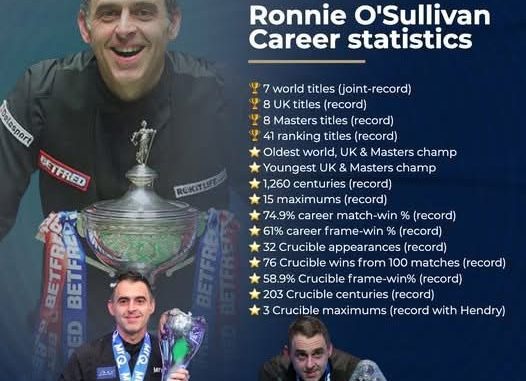
They said he was too quick, too raw, too unpredictable. But Ronnie O’Sullivan never set out to play the game by anybody else’s rules. From the moment he first picked up a cue, his path was written in speed, fire, and a refusal to conform. Snooker wasn’t a game to him — it was survival, escape, and freedom all rolled into one.
From the beginning, it was clear O’Sullivan was different. Where others studied the game slowly, cautiously, frame by frame, he attacked it with lightning instincts and audacity. He wasn’t born to crawl through matches, he was born to run through them, to make the baize feel alive. That attitude earned him a nickname that would define him forever — “The Rocket.”
At just 17, O’Sullivan announced himself to the world with his first ranking title, a fearless teenager dismantling seasoned professionals with a mix of elegance and ferocity. The word “prodigy” followed him everywhere, yet behind the headlines he was simply a boy chasing peace in the middle of life’s chaos. By 21, he had already climbed the mountain — World Champion, the youngest in the modern era. The records tumbled quickly. By the time he hit 30, whispers of “legend” grew louder, even as he wrestled with demons of pressure, expectation, and personal battles.
For all the brilliance, O’Sullivan’s story has never been one of smooth victories. His career has been punctuated by moments of self-doubt, walkouts, controversies, and inner struggles. At times, it seemed as though the Rocket might burn out before reaching his full potential. Yet every time he drifted from the sport, the table called him back. “It’s not just what I do, it’s who I am,” he once admitted.
And what he is has redefined snooker. For fans, O’Sullivan isn’t merely a champion, but an experience — a showman whose lightning breaks and fearless shot-making electrify arenas. His centuries are not just numbers on a scoreboard; they’re performances, etched into memory. The gasp of a crowd as he clears a table in minutes, the silent anticipation before a black ball, the eruption when it drops — these are the moments that make O’Sullivan timeless.
The numbers themselves are staggering. Seven World Championships, eight Masters titles, eight UK Championships. Forty-one ranking crowns in total. More than 1,200 century breaks — a milestone once thought impossible. Fifteen competitive 147 maximums, executed with the kind of artistry and speed that made them feel less like records and more like miracles. These statistics will stand in history long after his final frame.
Yet O’Sullivan himself has always insisted that the trophies and tallies are not the heart of his story. “The trophies are heavy,” he reflected once, “but it’s the moments that matter.” His greatness lies not only in what he won, but in how he made snooker feel: dangerous, unpredictable, exhilarating. Where the game was once methodical, O’Sullivan made it rock and roll.
Even as he grew older, he refused to fade. At 40, doubters suggested his best years were behind him. At 47, he proved them wrong, lifting his seventh Crucible crown — equalling Stephen Hendry’s record and reminding the world that greatness has no expiration date. It was more than a victory; it was a declaration. The Rocket wasn’t slowing down, he was still writing chapters in history.
Beyond the numbers, beyond the titles, Ronnie O’Sullivan’s true legacy is transformation. He made snooker not just a sport but a spectacle. He inspired generations to pick up a cue, to believe the game could be played with instinct as much as calculation, with passion as much as precision. He showed that greatness isn’t about perfection — it’s about daring to be yourself on every shot.
For three decades, O’Sullivan has played fast, free, and with his soul laid bare on the table. That’s why, when the dust settles, fans and critics alike will remember him not only as a champion, not only as a legend, but as the man who changed snooker forever.
Ronnie O’Sullivan — The Rocket. A prodigy, a rebel, a genius, and above all, the beating heart of the green baize.
Word count: ~705
Would you like me to shape this more like a newspaper-style feature (factual with quotes and reactions from other players) or keep it in this poetic-tribute style?
Leave a Reply